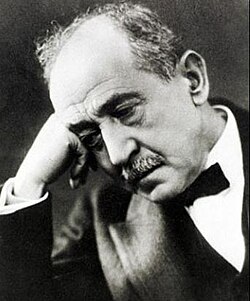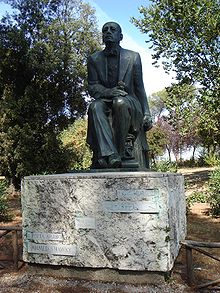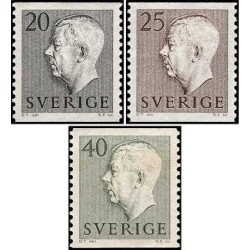- جدید
- ناموجود



Egypt (kingdom) 1957 - Ibrahim, Shawky 2v [:]
توجه : جهت برخورداری از تخفیف سایت ثبت نام و با کد کاربری خود سفارش ثبت نمائید. زیرا تخفیف فقط برای اعضا در نظر گرفته شده و قابل رویت است.
توجه : درج کد پستی و شماره تلفن همراه و ثابت جهت ارسال مرسوله الزامیست .
توجه:حداقل ارزش بسته سفارش شده بدون هزینه پستی می بایست 100000 ریال باشد.
Hafez Ibrahim (Arabic: حافظ إبراهيم, Ḥafeẓ Ibrāheem) (1871-1932) was known as the Poet of the Nile, and sometimes the Poet of the People, as his writings were widely revered by ordinary Egyptians. His poetry was often about subjects with which the majority of Egyptians were familiar, such as poverty and the politics of foreign occupation. He was one of several Egyptian poets that revived Arabic poetry during the latter half of the 19th century. While still using the classical Arabic system of meter and rhyme, these poets wrote to express new ideas and feelings unknown to the classical poets. Hafez is noted for writing poems on political and social commentary.
He was born on a ship floating in the Nile near Dairout, which is a city in Asyut District. His father was Egyptian, and his mother was Turkish. Both died when he was young. Before his mother died, she brought him to Cairo. There, he lived with his poor uncle, a government engineer. His Uncle later moved to Tanta, where Hafez went to school. Hafez was touched by his uncle's poverty; after a time, he left his uncle. ِ After this, Hafez spent some time living on the Tanta streets. He eventually ended up in the office of Muhammed Abu Shadi, who was one of the 1919 revolution leaders.
Hafez Ibrahim is quoted of saying: “When you educate a woman, you create a nation.”
Many poems were written by Hafez, for example:
|
|
| Ahmed Shawqi أحمد شوقي | |
|---|---|

Portrait of Ahmed Shawqi.
|
|
| Born | December 25, 1868 Cairo, Khedivate of Egypt |
| Died | October 14, 1932 (aged 64) Cairo, Kingdom of Egypt |
| Occupation | Playwright, poet |
| Period | 19th–20th century |
Ahmed Shawqi (1868–1932) (Arabic: أحمد شوقي, Egyptian Arabic pronunciation: [ˈʔæħmæd ˈʃæwʔi]), also written as Ahmed Chawki, nicknamed Amīr al-Shu‘arā’ (The Prince of Poets, Arabic: أمير الشعراء), was one of the greatest Arabic poets laureate,[1] an Egyptian poet and dramatist who pioneered the modern Egyptian literary movement, most notably introducing the genre of poetic epics to the Arabic literary tradition. On the paternal side he was of Circassian, Greek[2] and Kurdish descent,[3] and on the maternal side of Turkish and Greek descent.[4]
Raised in a privileged setting with Turkish, Kurdish, Circassian, Greek, and Arab roots,[5] his family was prominent and well-connected with the court of the Khedive of Egypt. Upon graduating from high school, he attended law school, obtaining a degree in translation. Shawqi was then offered a job in the court of the Khedive Abbas II, which he immediately accepted.
After a year working in the court of the Khedive, Shawqi was sent to continue his studies in Law at the Universities of Montpellier and Paris for three years. While in France, he was heavily influenced by the works of French playwrights, most notably Molière and Racine. He returned to Egypt in 1894, and remained a prominent member of Arab literary culture until the British forced him into exile in southern Spain, Andalusia, in 1914. Shawqi remained there until 1920, when he returned to Egypt. In 1927 he was crowned by his peers Amir al-Sho’araa’ (literally, "the Prince of Poets") in recognition of his considerable contributions to the literary field.
He used to live in ‘Karmet Ibn Hani’ or Ibn Hani’s Vineyard at Al-Matariyyah area near the palace of the Khedive Abbas II at Saray El-Qobba until he was exiled. After returning to Egypt he built a new house at Giza which he named the new Karmet Ibn Hani.[6] He met Mohammed Abdel Wahab, and introduced him for the first time to art, making him his protégé as he gave him a suite in his house. The house later on became Ahmed Shawki Museum and Mohammed Abdel Wahab became one of the most famous Egyptian composers.
Shawqi’s work can be categorized into three main periods during his career. The first coincides with the period during which he occupied a position at the court of the Khedive, consisting of eulogies to the Khedive: praising him or supporting his policy. The second comprised the period of his exile in Spain. During this period, his feeling of nostalgia and sense of alienation directed his poetic talent to patriotic poems on Egypt as well as the Arab world and panarabism. The third stage occurred after his return from exile, during that period he became preoccupied with the glorious history of Ancient Egypt and Islam. This was the period during which he wrote his religious poems, in praise of the Prophet Muhammad. The maturation of his poetic style was also reflected in his plays, the most notable of which were published during this period.
Shawqi was the first in modern Arabic literature to write poetic plays. He wrote five tragedies:
and two comedies:
in addition to a prose play: the Princess of Andalusia.
He also wrote chapters of prose, collected under the title: The Markets of Gold.
تشکر نظر شما نمی تواند ارسال شود
گزارش کردن نظر
گزارش ارسال شد
گزارش شما نمی تواند ارسال شود
بررسی خود را بنویسید
نظر ارسال شد
نظر شما نمی تواند ارسال شود

Egypt (kingdom) 1957 - Ibrahim, Shawky 2v [:]
check_circle
check_circle




















